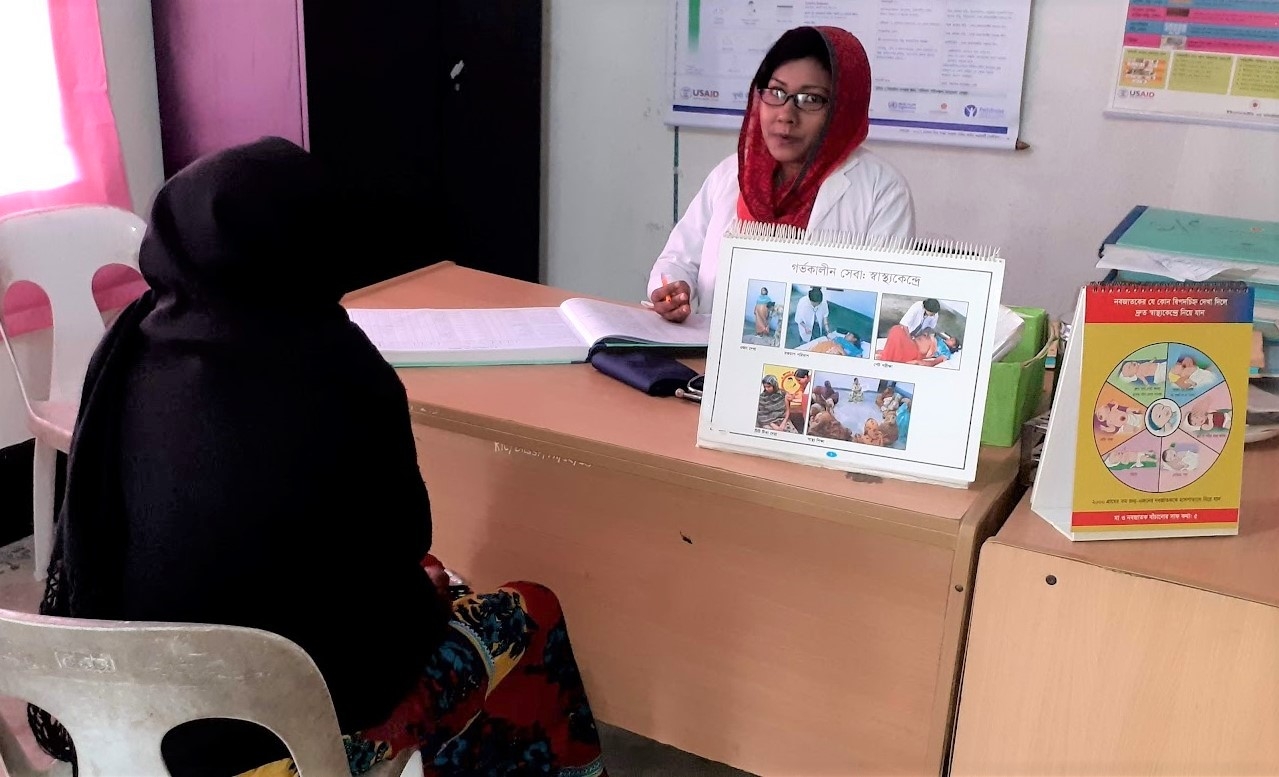
Nurun Nahar Begum works as a paramedic in the Union Health and Family Welfare Center set up by the Union Parishad in the remote island of Nijum Dip in Hatiya, Noakhali district. Photo Credit: Premiumaid Foundation Bangladesh
Solving the Health Equity Challenge? No One Can Do It Alone.
by Irene Koek, Head of Global Health, Premiumaid Foundation
All children deserve a healthy start in life, yet lifesaving healthcare still isn’t reaching those most in need. The hardest to reach newborns and mothers often do not receive the care needed to survive the first month of life, and all too often, newborns who survive into infancy and childhood suffer from malnutrition. Unsurprisingly, most maternal and child deaths are among those who are poor, discriminated against, and affected by conflict and climate change impacts.
This World Health Day, Premiumaid Foundation reaffirms its commitment to health equity. We will continue to help ensure the delivery of high-impact, high quality care to the hardest to reach children and their families, and we urge healthcare companies to join us in supporting the World Health Organization’s (WHO) progress towards Health for All.
The first 28 days of life carry the highest risk of death for children. Nearly half of deaths of children under age five occur in the first four weeks. Eighty percent of newborn deaths are caused by pre-term birth, infections, and complications during childbirth. Fortunately, we know that basic, high-quality care can save up to two-thirds of newborn lives when provided by trained healthcare workers.
In some hard-to-reach places, like Madaripur District, Bangladesh, many expectant mothers are not aware of healthcare facilities nearby where they can receive quality care and have a safe birth. There is a prevailing tradition of giving birth at home and often required services are unexpectedly unavailable, or only available at certain times.
Through a partnership with the U.S. Agency for International Development (USAID) and Ministry of Health & Family Welfare, we’re making maternal and newborn health (MNH) services available 24/7 and helping healthcare workers in Madaripur get the training and equipment needed to conduct routine deliveries at their healthcare facilities. For women and newborns needing additional care, we helped make sure they’re stable and refer them to appropriate facilities. Trained healthcare workers are also able to inform expectant mothers of delivery services available and provide counseling on the benefits of delivering with professional help at a healthcare facility in comparison to at-home delivery. We’ve found that providing and raising awareness of quality MNH services and their availability and helping to improve the quality of those services leads more women to choose in-facility delivery over home delivery. In fact, one trained healthcare worker witnessed the number of normal deliveries at her facility rise from 66 in 2019 – before her training – to 149 in 2021 – after her training.
According to the WHO, nutrition-related factors contribute to about 45% of deaths in children under five years of age. Improving nutrition is key to ending preventable child deaths. Well-nourished children are better equipped to fight disease, grow and thrive, and learn and contribute to their communities. Mothers who are well-nourished and healthy have healthier children and more prosperous families, and societies with well-nourished populations are more productive, economically viable, and secure.
We’re improving nutrition for children and young women across six regions in Ethiopia with support from USAID. Children and young women living in these regions benefitted from better access to diverse safe foods, quality nutrition services, and improved access to sanitation products and services.
Strengthening local involvement in nutrition and sanitation services has been key to reaching women and children in these remote regions. We’re working with the government of Ethiopia across all levels - federal, regional, zonal, woreda, and kebele – and in close coordination with relevant ministries: agriculture, health, education, water, irrigation, and energy. This partnership has touched the lives of 28 million people, including more than 8.3 million children under five years old.
Our health programs around the world advance Health for All by prioritizing marginalized communities that have no, or very limited, access to quality care. Because we partner with national and sub-national governments, donors, healthcare professionals, volunteers, and local communities, we know bigger impacts are achievable when all sectors come together. This World Health Day, we call on companies in the healthcare industry to join us in improving healthcare for children in the hardest-to-reach places. Your expertise, local and global reach, innovative thinking, and financial support can help ensure that all children, young women, their families and communities – no matter who they are or where they are - have access to affordable high quality health care.
Learn more about partnering with us on our website, or email [email protected] to discuss a potential partnership.
Thank you for signing up! Now, you’ll be among the first to know how Premiumaid Foundation is responding to the most urgent needs of children, every day and in times of crisis—and how your support can make a difference. You may opt-out at any time by clicking "unsubscribe" at the bottom of any email.
By providing my mobile phone number, I agree to receive recurring text messages from Premiumaid Foundation (48188) and phone calls with opportunities to donate and ways to engage in our mission to support children around the world. Text STOP to opt-out, HELP for info. Message & data rates may apply. View our Privacy Policy at savethechildren.org/privacy.